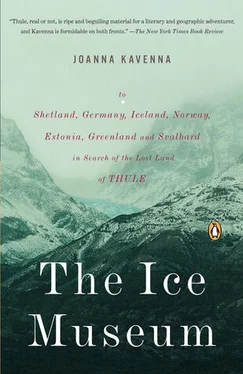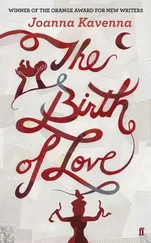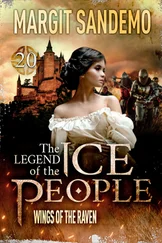The city lay under dim sunshine. The sea shone in the pale light. I drove out of Tallinn, through the marshes into a countryside richly forested in places, and starkly devastated in others, littered with sunken debris, wreckage from the past. The land was a brilliant orange; the low shrubs and bracken shimmered in the afternoon sunshine, which poured across the flat lands. The branches of the juniper trees hung over the roadsides. The countryside threw out jarring but resonant objects—among the forests there appeared the ugly breezeblocks and decaying steel girders of an abandoned collective farm. After an hour I reached Keila-Joa, pausing briefly to look at a waterfall, which thundered down a sheer rock face. There was a café selling herring sandwiches, a suspension bridge which shuddered as I crossed it, and a path winding alongside the river. I walked through the empty forests, a thunderstorm erupted, the trees bucked in a sudden wind, and clouds of rain turned the path to mud. Soaked, I ran through the trees until the forest came to an end at a grey beach. A glassy white sea stretched away; there were swans bobbing incongruously on the waves.
In 1991, Keila-Joa had been covered with remnants from the Soviet occupation. It was the site of a Soviet Army missile base, a patch of polluted ground, with liquid rocket fuel in the soil and groundwater. It had all been cleaned, a woman in the café told me, as I sat by the fire trying to dry my clothes. The polluted soil had been taken away, the water purified. But the collapsing military bases and decaying industrial plants remained, spread across the marshlands, bleakly symbolic of the Communist appropriation of the countryside, the state of enforced inertia, the enforced ignorance of the Estonians. The Estonians had no knowledge of what was happening within the barriers and fences; they had no control over what happened outside them.
Later, I arrived at Viimsi Peninsula; an Estonian flag fluttered from a pole. There was a security gate, but a thickset guard waved me through. President Lennart Meri had a fine view of the sea. Everything was silent, except for the sound of a dog barking. His house was an elegant Scandinavian-style place, with white walls. I brought the car to a halt by the door, as the dog began a staccato symphony. The wind blustered along the beach. The windows were dark, reflecting the ragged beach and the fluttering flag.
I was expecting an assistant to meet me at the door, but there was a sturdy old man bowing towards me. For a bizarre moment I thought he was Nansen, and my speechless amazement was hardly the right way to open. The hall was dark, he came out of the gloom; on an icy plain he might have passed at a distance for the old explorer stumbling across the snow. But he was reminiscent of Nansen even when we moved into the light, with his height and his fixed, brilliant eyes. He was wearing an immaculate suit, smiling bleakly at the silence outside. He gripped my hand firmly, and then he beckoned me into the house.
‘Take your coat and put it over there. I am Lennart Meri. This is my assistant,’ he said, pointing towards a young man with a clipboard. ‘He’ll be with us today.’ And the man followed us as we walked, politely keeping a distance behind the former president.
Meri gently pushed away his dog and threw open a door into a library. He was supremely smart and upright and his library was equally meticulous, arranged into taut rows. We paused for a moment in the library, looking across the bay, out to sea.
‘Here I remember my travels,’ he said.
‘It’s a fine view,’ I said.
We passed into a quiet study, books covering the walls, and he sat down heavily in a chair and then hoisted himself straight. He spoke slowly, sonorously. ‘These shelves are filled with all the books I have to read, before I start my book. I hope I have time.’ He nodded, at his shelves. He seemed to be joking; there was a trace of a smile on his lips. ‘Yes, we can talk about Thule,’ said Meri. ‘I can even tell you where Thule is, as I understand it. But first I have to tell you a few things. This is a small country; no one knows much about it. You should understand a little of our country, if you want to hear what I mean about Thule. You should know that here, in this land, we are very much aware of our stones. We are very much aware of our marshes and beautiful lakes, and our islands and our lovely coast. We have been living here for around five hundred centuries. It has an effect on the way of thinking. You have the same feeling as being married for five hundred centuries.
‘There are trees in this country which have been here for thousands of years,’ the old president said, looking through the window, at the flag drooping on the pole outside, at the white glare from the sun.
‘I remember before the Germans and Soviets came,’ he said. ‘I remember my childhood in the 1930s very vividly, my very elementary feelings. I remember that we did not have to lock our doors. I remember the very simple things which were so common. We had been away on holiday to France and we returned in our car—it was not very usual—on a hot day, and we asked to drink something in a village in Estonia, and I still remember that we were given milk, and nobody wanted milk. And I remember the feelings, that the farmer’s wife was furious that we preferred water to her milk—that we would not take her hospitality. Everyone was very proud of their work. World War Two destroyed everything—it brought a tragic sense of understanding about history. Despite everything, events materialized in a way we did not expect.’
The Germans and the Russians fought in Estonia, and with the collapse of Hitler’s armies the USSR gained control. The Estonian writer Jaan Kross saw it as consummate betrayal; he said it felt like a blow to the head with a club, a blow which made the Estonians feel that all resistance was futile. The scene was grotesque for the Estonians to imagine, Kross had written: Stalin and Roosevelt talking together in 1945, with Stalin smiling, speaking in sing-song Georgian tones, and the interpreter presenting the case—there was really no need for international observers in the Baltic States, no need between old war allies—as Roosevelt sat, wheelchair-bound, taking painkillers. Kross had imagined that Roosevelt had a terrible headache, he was in constant agony and he couldn’t apply his mind to the problem. So he told Stalin to go ahead with elections.
Thousands of Estonians fled; by 1945 there were thousands of Estonian refugees in Sweden. They hid on boats crossing the Baltic Sea; they rowed themselves across the sea. The purges soon began—most of those who had served in the Home Guard during the war or had been conscripted into the German Army were arrested and deported.
‘The Soviet soldiers appeared with their bayonets, and the KGB men in plain clothes,’ said Meri, casting a side-glance towards me. ‘There had been a certain very primitive hope that the Germans would restore Estonian independence. This did not happen, and things became worse still after the Soviets returned. The Estonians lost more people during the first years of the Soviet occupation than during the German occupation. The Estonians lost more Jews during the Soviet times than during the German occupation. The Jews were lawyers, doctors, teachers; the Soviets thought they were class enemies and so they were deported,’ he said, slowly.
Apart from his low, slow voice, the house was silent. During the hours we spoke, the silence was occasionally broken: by the jarring ring of the phone, by the grind of a car’s tyres on the gravel outside. Mostly it lay heavily upon the room, a thick blanket of silence, threatening to overwhelm the place. He tried to talk against it, but it fell thickly into his pauses, and he often paused, as if exhausted by the effort of speaking into the dense silence. Into the silence Meri spoke, and before each word came a pause, a brief moment of surrender. When the word came it was perfectly placed, his voice strong and deep, his English studiously accurate, littered with unusual words, collected like curios. He held his head in his hands and stared onto the table.
Читать дальше












